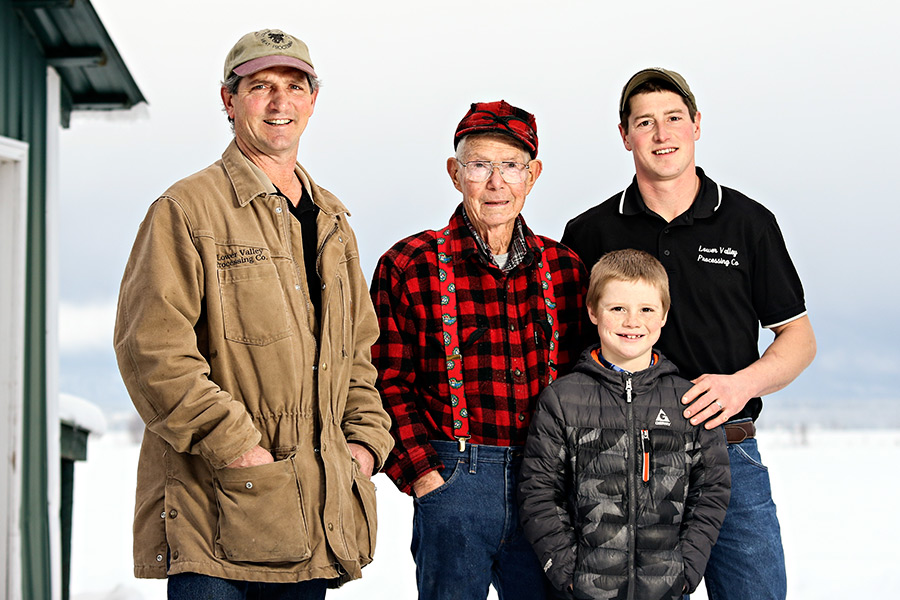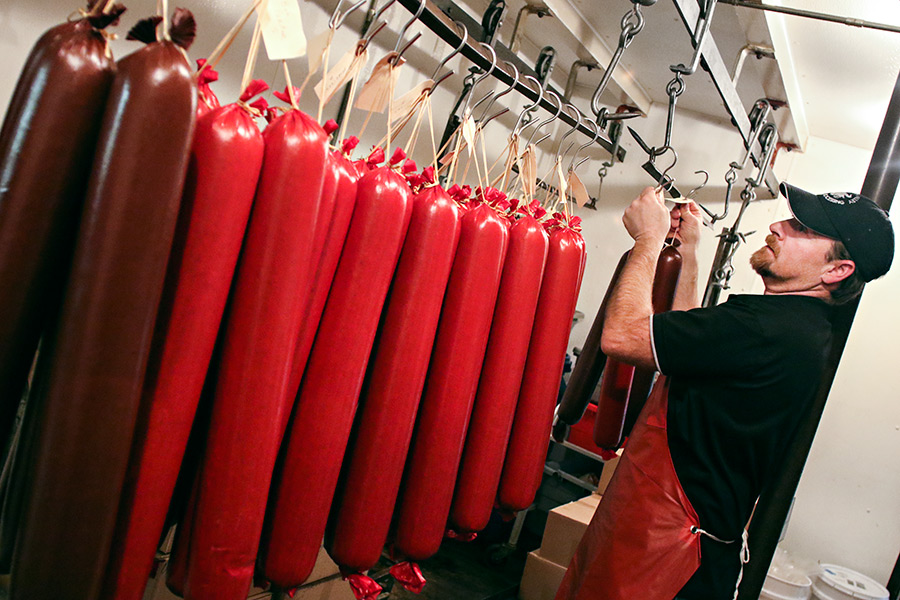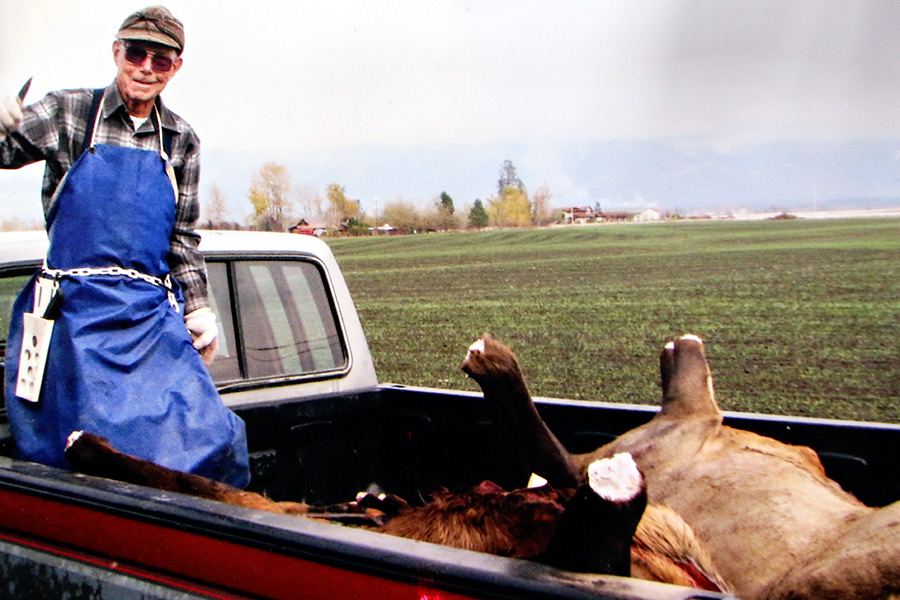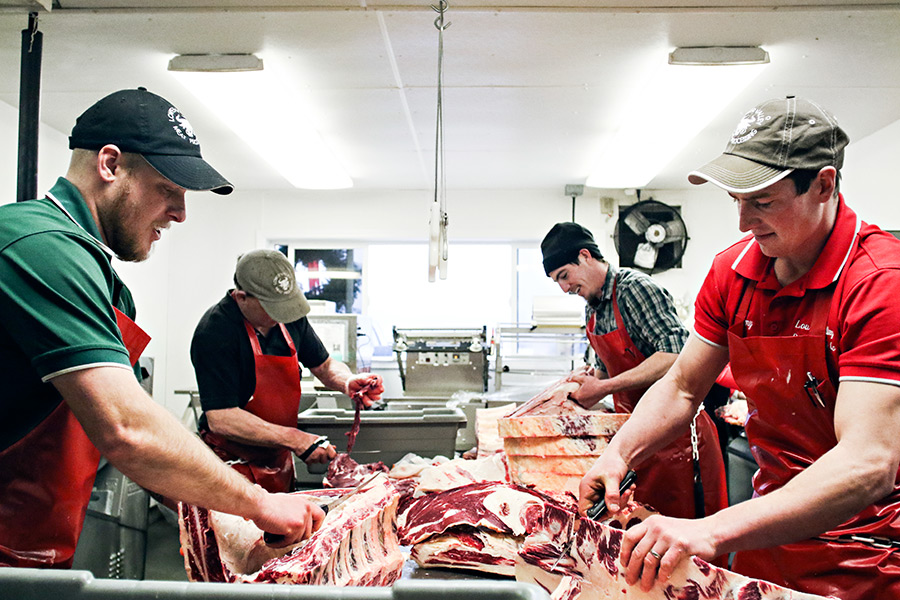A Legacy in Lower Valley
After four decades, Lower Valley Processing continues to grow its business, one generation and a handshake deal at a time
By Molly Priddy
Lower Valley Processing Co. sits in a sea of farmland south of Kalispell, nestled in an island of trees, its 40 acres bordered on the south by Lower Valley Road and to the north by the calm, easy waters of Church Slough, fed by the Flathead River.
At the entrance, a massive pig statue named Betty Lou greets visitors with happy eyes. To the east, low clouds obstruct the view on a cold winter day, but the wall of mountains hemming in the valley loom large.
It’s idyllic, this farmland – a piece of a time capsule from simpler times, back when Chuck and Sylvia Plummer were raising their family. If you can make him stand still long enough in between mucking out the livestock stalls or whatever other chore he may be doing, Chuck, now 89, will tell you about how high the waters rose during the historic 1964 flood, about how the kids – now middle-aged adults – sat in a boat floating near the mailbox.
“They were beautiful kids,” Chuck said, remembering.
Lower Valley Processing Co. is one of the premier meat processing plants in Northwest Montana, with more than 40 years of history and know-how going into their products. But the more some things change, like technological efficiencies that make the back-breaking work just a bit easier, the more they stay the same.
There are now four generations of Plummers working at the plant, which has seen some expansion, pushing into the apple orchard and the barn. When Chuck and Sylvia first launched the business in 1974, they ran it out of their three-car garage.
Now there’s a slaughterhouse and a full sausage kitchen, along with daily visits from Department of Livestock inspectors. But coffee is always brewing in the office, and there’s usually a couple of Plummer kids there to say hello.
“It’s like a family farm,” said Jeremy Plummer. “It’s a good way of life.”
Life at the plant follows a certain rhythm. Wednesdays are typically slaughter days, when Jeremy and his crew can make their way through dozens of cattle carcasses in less than an hour, the saw whining and steaks flying.
Ranchers bring their livestock for slaughter and processing, and hunters also bring in their fresh kills to be butchered and turned into sausages, straight from Chuck’s 50-year-old recipes. Lower Valley also sells locally grown beef and pork in wholesale and retail.
“Our summer sausage has been the same for 50 years,” Jeremy said. “The basic bread and butter of the company is custom cutting of domestic animals and wild game.”
Lower Valley established itself early with a reputation for quality meat processing and consistent, good sausages and cured and smoked products. It is also home to the state’s second oldest apprenticeship, which Chuck completed in 1952.
The first wholesale account Chuck secured was with Moose Miller, whose bar and pizza kitchen Moose’s is one of the cornerstone businesses in Kalispell.

Wes Plummer, Chuck’s son, estimated that Lower Valley has slaughtered and delivered well over 6,000 pigs to Moose’s, a number at which Nancy Moser, who runs the administrative finance department for Moose’s, laughed and said was probably on the low end.
Moser has worked at Moose’s for 31 years, and said the food served there has used Lower Valley pork as long as she can remember.
“Our working relationship has just been the best, and it’s been consistently that way, the product and the service,” Moser said. “We just wouldn’t think of going anywhere else. Their cure is just so good. It’s just right on.”
Chuck and Sylvia also added Jim and Babette Johnson as their first non-wholesale customers; the Johnsons ran a cow-calf operation just east of Swan River School.
Now, the Johnsons’ grandson, Tyler Johnson, said he and his dad still go to Lower Valley with their livestock. The Plummers said they pride themselves on establishing old-fashioned handshake relationships with farmers and ranchers, keeping the business at a personal level.
Johnson said this type of service is becoming increasingly rare, and the Plummers have kept their promises.
“It’s been very good, super good people to work with,” Tyler Johnson said. “They’re very friendly and always very accommodating. Once in a while you run into a pickle where you’ve got to get something slaughtered and they’ll fit you in.”
Johnson said he remembers feeling lucky to go along on the ride to Lower Valley because whoever went would receive an apple from Chuck. It was a different time, when there were more farms and small, family-owned processing plants.
“In this valley, I’ve been here my whole life, there used to be a lot of small family farms. A lot of them have gone by the wayside. Kids grow up and they’re not interested and they want something else, and that’s OK, but I guess I always liked the cattle,” Johnson said.

Ever since Chuck retired 28 years ago – if one could say a man who still works whenever he’s at the plant is retired – his son and daughter-in-law Wes and Sue Plummer have been at the helm, growing an established small business into a larger economic force, collecting 140 wholesale accounts and seeing increased demand, now at a pace of about 10 percent a year.
Wes said it’s a fine line to maintain the type of family-based, small business feel they’ve cultivated here while also trying to keep expanding.
“It’s really a balancing act,” Wes said.
The future is a constant topic at Lower Valley; just look around and it will inevitably meet your eye. When one Plummer starts aging out, there’s another generation to fill in. In 2012, Jeremy Plummer and long-time employee Jason Mahlen became co-owners along with Jeremy’s parents, Wes and Sue.
And Jeremy’s 9-year-old son, Sam, is learning the ropes. He’s helped skin carcasses for a few years now, and he raises pigs through 4-H.
“It’s a lot of work,” Sam said. “It’s fun.”
Jeremy’s two daughters also help, wrapping meat and greeting customers, and sometimes adding original drawings to packaged products. His sister lives close by, and his parents live on the farm acreage. Most everyone is just a stone’s throw away from the nucleus of the plant.
“There’s family everywhere,” Jeremy said. “That’s what (my grandparents) live for.”

Jeremy didn’t necessarily start out thinking he’d take over the family business, but after following his interest in fisheries biology and realizing it wasn’t what he wanted, Jeremy came back to the hard work he loved at the plant, and stayed.
Most of the employees have been there for decades, Jeremy said, and they’re full of institutional knowledge and good stories. The main struggle, he said, is keeping up with demand. To help keep the process efficient, Lower Valley is investing in better infrastructure, like new freezers and a new smoker with a smartphone application that not only smokes in half the time, but is also controlled from a phone.
Jeremy said Lower Valley crews slaughter thousands of livestock animals each year, and the volume is only increasing. With small plants like Lower Valley’s disappearing, Jeremy said they’re getting a lot of business from east of the divide as well.
Gary Hamel, chief of the meat and poultry inspection bureau at the state Department of Livestock, said there are 38 fully inspected plants in Montana, a number that has stayed more or less the same in the last four years.
In the 1980s, the state took on a host of new regulations and rules for meat processing plants, including the federal Humane Methods of Slaughter Act, the Meat Inspection Act, and the Poultry Inspection Act.
These rules add requirements for checking the animals’ health before slaughter, and inspection afterward, including their organs and lymph nodes. It’s about safety, Hamel said, and an inspector now visits the Lower Valley plant daily.
“They are very popular,” Hamel said. “They do a nice job.”
And with farm-to-table and eat-local food movements continuing to gain popularity, the Plummers figure they’re going to have to contend with growth while maintaining their traditions.
“People just want to know where their meat’s coming from,” Wes said. “Everybody wants natural. We sell a lot of local beef here, and even raise some of our own.”
Winter has left the farm snow-covered and gray, but the pulse of life is strong here. Looking at it in a more philosophical light, Lower Valley is a port on the river running the border between life and death, where creatures meet their ends in humane but efficient ways, only to become a source of life again for the company’s many customers, as well as the Plummers themselves.
It’s a necessary part of the circle of life, and the Plummers hope to continue their traditions of quality, hard work, consistency, and taking care of their customers.
Because while it’s technically about processing meat, Wes Plummer said the reality of Lower Valley reaches to a more personal level for him and his family.
“It makes us proud to feed all these other families and watch them grow,” he said.